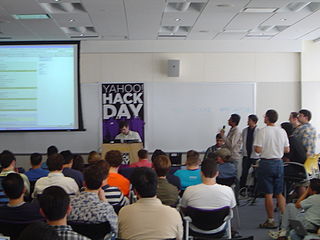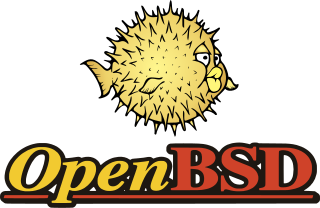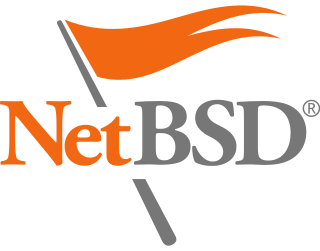
GNU is an extensive collection of free software, which can be used as an operating system or can be used in parts with other operating systems. The use of the completed GNU tools led to the family of operating systems popularly known as Linux. Most of GNU is licensed under the GNU Project's own General Public License (GPL).

Wikipedia began with its first edit on 15 January 2001, two days after the domain was registered by Jimmy Wales and Larry Sanger. Its technological and conceptual underpinnings predate this; the earliest known proposal for an online encyclopedia was made by Rick Gates in 1993, and the concept of a free-as-in-freedom online encyclopedia was proposed by Richard Stallman in December 2000.

Lynx is a customizable text-based web browser for use on cursor-addressable character cell terminals. As of 2020, it is the oldest web browser still being maintained, having started in 1992.
Slashdot is a social news website that originally billed itself as "News for Nerds. Stuff that Matters". It features news stories on science, technology, and politics that are submitted and evaluated by site users and editors. Each story has a comments section attached to it where users can add online comments. The website was founded in 1997 by Hope College students Rob Malda, also known as "CmdrTaco", and classmate Jeff Bates, also known as "Hemos". In 2012, they sold it to DHI Group, Inc.. In January 2016, BIZX acquired Slashdot Media, including both slashdot.org and SourceForge. In December 2019, BIZX rebranded to Slashdot Media.

vi is a screen-oriented text editor originally created for the Unix operating system. The portable subset of the behavior of vi and programs based on it, and the ex editor language supported within these programs, is described by the Single Unix Specification and POSIX.
Cambridge University Press & Assessment is a department of the University of Cambridge. It is both a global academic and educational publisher as well as a leading provider of educational assessments. As a publisher, it has a global sales presence, publishing hubs, and offices in more than 40 countries. It publishes over 50,000 titles by authors from over 100 countries. Its publishing includes more than 380 academic journals, monographs, reference works, school and university textbooks, and English language teaching and learning publications. As a provider of educational assessment, it serves over 8 million learners in over 170 countries. It manages several assessment organisations: Oxford, Cambridge and RSA Examinations (OCR), Cambridge Assessment International Education, Cambridge Assessment Admissions Testing, and Cambridge Assessment English for learners of the English language.

Science, also widely referred to as Science Magazine, is the peer-reviewed academic journal of the American Association for the Advancement of Science (AAAS) and one of the world's top academic journals. It was first published in 1880, is currently circulated weekly and has a subscriber base of around 130,000. Because institutional subscriptions and online access serve a larger audience, its estimated readership is 570,400 people.

The English Wikipedia is the English-language edition of the free online encyclopedia Wikipedia. It was founded on 15 January 2001 as Wikipedia's first edition and, as of June 2021, has the most articles of any edition, at 6,355,450. As of August 2021, 11% of articles in all Wikipedias belong to the English-language edition. This share has gradually declined from more than 50 percent in 2003, due to the growth of Wikipedias in other languages. The edition's one-billionth edit was made on 13 January 2021. The English Wikipedia has received praise for its enablement of democratization of knowledge and extent of coverage.
PF is a BSD licensed stateful packet filter, a central piece of software for firewalling. It is comparable to netfilter (iptables), ipfw, and ipfilter.
Engadget is a multilingual technology blog network with daily coverage of gadgets and consumer electronics. Engadget operates a total of ten blogs—four written in English and six international versions with independent editorial staff. Engadget has ranked among the top five in the "Technorati top 100" and was noted in Time for being one of the best blogs of 2010. It has been operated by AOL since October 2005.

Ars Technica is a website covering news and opinions in technology, science, politics, and society, created by Ken Fisher and Jon Stokes in 1998. It publishes news, reviews, and guides on issues such as computer hardware and software, science, technology policy, and video games.

A hackathon is a design sprint-like event; often, in which computer programmers and others involved in software development, including graphic designers, interface designers, project managers, domain experts, and others collaborate intensively on software projects.
No Starch Press is an American publishing company, specializing in technical literature often geared towards the geek, hacker, and DIY subcultures. Popular titles include Hacking: The Art of Exploitation, Andrew Huang's Hacking the Xbox, and How Wikipedia Works.

Wikipedia is a free content, multilingual online encyclopedia written and maintained by a community of volunteer contributors through a model of open collaboration, using a wiki-based editing system. Wikipedia is the largest and most-read reference work in history, and is consistently one of the 15 most popular websites as ranked by Alexa; as of 2021, it was ranked as the 13th most popular site. The project carries no advertisements and is hosted by the Wikimedia Foundation, an American non-profit organization funded mainly through small donations.

FreeBSD is a free and open-source Unix-like operating system descended from the Berkeley Software Distribution (BSD), which was based on Research Unix. The first version of FreeBSD was released in 1993. In 2005, FreeBSD was the most popular open-source BSD operating system, accounting for more than three-quarters of all installed simply, permissively licensed BSD systems.
GBDE, standing for GEOM Based Disk Encryption, is a block device-layer disk encryption system written for FreeBSD, initially introduced in version 5.0. It is based on the GEOM disk framework. GBDE was designed and implemented by Poul-Henning Kamp and Network Associates Inc..

OpenBSD is a security-focused, free and open-source, Unix-like operating system based on the Berkeley Software Distribution (BSD). Theo de Raadt created OpenBSD in 1995 by forking NetBSD. According to the website, the OpenBSD project emphasizes "portability, standardization, correctness, proactive security and integrated cryptography."

Bomis was a dot-com company best known for supporting the creations of free-content online-encyclopedia projects Nupedia and Wikipedia. It was co-founded in 1996 by Jimmy Wales, Tim Shell, and Michael Davis. By 2007, the company was inactive, with its Wikipedia-related resources transferred to the Wikimedia Foundation.

NetBSD is a free and open-source Unix-like operating system based on the Berkeley Software Distribution (BSD). It was the first open-source BSD descendant officially released after 386BSD was forked. It continues to be actively developed and is available for many platforms, including servers, desktops, handheld devices, and embedded systems.

OpenZFS is an open-source storage platform that encompasses the functionality of traditional filesystems and volume manager. It includes protection against data corruption, support for high storage capacities, efficient data compression, snapshots and copy-on-write clones, continuous integrity checking and automatic repair, encryption, remote replication with ZFS send and receive, and RAID-Z. The eponymous OpenZFS project brings together developers from the illumos, Linux, FreeBSD and macOS platforms, and a wide range of companies via the annual OpenZFS Developer Summit.














